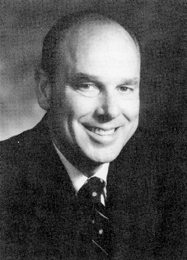1993 Thomas E. Everhart
Technology and Human Progress: The Information Revolution
 Born in Kansas City, Missouri, Thomas Everhart attended Harvard University and was graduated magna cum laude in 1953 with an A.B. degree in physics. He attended UCLA and received an M.S. degree in applied physics in 1955, and from there went on to Cambridge University and was awarded an engineering doctorate in 1958 for his research on the scanning electron microscope.
Born in Kansas City, Missouri, Thomas Everhart attended Harvard University and was graduated magna cum laude in 1953 with an A.B. degree in physics. He attended UCLA and received an M.S. degree in applied physics in 1955, and from there went on to Cambridge University and was awarded an engineering doctorate in 1958 for his research on the scanning electron microscope.
Upon his return to the States, Dr. Everhart assumed the position of assistant professor in the Department of Electrical Engineering at the University of California, Berkeley. He was associated with the university for twenty years, and served as department chairman for five years.
In 1979, Dr. Everhart was named dean of the College of Electrical Engineering at Cornell University, where he also served as professor in the department for five years.
From 1984 to 1989, Dr. Everhart served as chancellor at the University of Illinois at Urbana-Champaign and concurrently held the position of professor of electrial and computer engineering.
Since 1987, Dr. Everhart has served as president of the California Institute of Technology in Pasadena, California, and as professor of electrical engineering and applied physics at that institution. As president, he oversees a campus of 1800 students, 300 faculty, and more than $100 million in sponsored research activities each year.
Caltech is also responsible for NASA's Jet Propulsion Laboratories and their accompanying $1 billion budget.
In addition to leadership within the academic community, Dr. Everhart is closely involved with industry, serving on the board of directors for General Motors and Hewlett-Packard. He also serves as a member of the National Academy of Engineering Council, and on the executive committee of the Council on Competitiveness.
Dr. Everhart is the recipient of numerous awards and honors including the Institute of Electrical and Electronic engineers 1984 Centennial Medal, a John Simon Guggenheim Memorial Fellowship, and the Benjamin Garver Lamme Award. He was named a fellow to the American Academy of Arts and Sciences in 1990, and also received honorary degrees from Illinois Wesleyan University, Pepperdine University, and the Colorado School of Mines that year.
Dr. Everhart's address focuses on the consequences of the information revolution that has been forming during the past quarter century and around the globe. In his lecture, he states:
"In a world that seems ever smaller, the economic, physical, and mental well being of each nation is of importance to its citizens. Such well being depends increasingly on information and knowledge. What information is presented to the population determines its mood, its will, and perhaps eventually, its morality. . . As the world becomes increasingly one global village, where the actions within one nation affect all nations, these are issues that need broader understanding, broader agreement, and concerted action, so that all people can benefit."
Dr. Everhart's lecture represents the second installment in the Gould Distinguished Lecture series.
Contact
Nicole Marek
Development Specialist
801-213-7140
Email
Past Lectures
1992 Inaugural William R. Gould
2023 Dr. Tomasso Lenzi
2023 Dr. Jacob A George
2024 Dr. Fátima Rodriguez